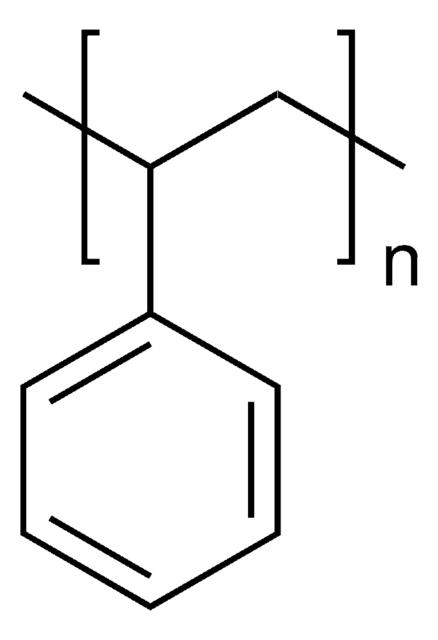76552
Polystyrol (niedermolekular) Standard ReadyCal Set M(p) ~250-65000
for GPC
Anmeldenzur Ansicht organisationsspezifischer und vertraglich vereinbarter Preise
Alle Fotos(1)
About This Item
UNSPSC-Code:
41116107
NACRES:
NA.24
Empfohlene Produkte
Qualität
for GPC
Qualitätsniveau
Haltbarkeit
limited shelf life, expiry date on the label
Methode(n)
gel permeation chromatography (GPC): suitable
Format
neat
Lagertemp.
2-8°C
Anwendung
- Low molecular weight polystyrene standards for gel permeation chromatography: The characterization of branched ultrahigh molar mass polymers using asymmetrical flow field-flow fractionation and size exclusion chromatography highlighted the essential role of low molecular weight polystyrene standards in determining polymer distribution and characteristics, contributing significantly to advances in polymer science research (Otte et al., 2011).
Komponenten
ReadyCal Standards are polymer cocktails pre-weighed into autosampler vials for the convenient calibration of GPC/SEC/GFC systems.
This kit contains 10 sets of 3 color-coded vials, each containing four polystyrenes of different molar masses. Molar masses range from ~266 to ~66,000 Da and are carefully selected so that polymer traces are baseline separated.
Sufficient material provided for at least 10 calibrations.
Suitable for calibrations in THF, toluene, DMF, DMAc, chloroform, TCB, DCB and NMP.
This kit contains 10 sets of 3 color-coded vials, each containing four polystyrenes of different molar masses. Molar masses range from ~266 to ~66,000 Da and are carefully selected so that polymer traces are baseline separated.
Sufficient material provided for at least 10 calibrations.
Suitable for calibrations in THF, toluene, DMF, DMAc, chloroform, TCB, DCB and NMP.
Lagerklassenschlüssel
11 - Combustible Solids
WGK
WGK 3
Flammpunkt (°F)
No data available
Flammpunkt (°C)
No data available
Hier finden Sie alle aktuellen Versionen:
Besitzen Sie dieses Produkt bereits?
In der Dokumentenbibliothek finden Sie die Dokumentation zu den Produkten, die Sie kürzlich erworben haben.
Kunden haben sich ebenfalls angesehen
Barbara De Meester et al.
Nature communications, 11(1), 5020-5020 (2020-10-08)
Lignin causes lignocellulosic biomass recalcitrance to enzymatic hydrolysis. Engineered low-lignin plants have reduced recalcitrance but often exhibit yield penalties, offsetting their gains in fermentable sugar yield. Here, CRISPR/Cas9-generated CCR2(-/*) line 12 poplars have one knockout CCR2 allele while the other
Unser Team von Wissenschaftlern verfügt über Erfahrung in allen Forschungsbereichen einschließlich Life Science, Materialwissenschaften, chemischer Synthese, Chromatographie, Analytik und vielen mehr..
Setzen Sie sich mit dem technischen Dienst in Verbindung.


